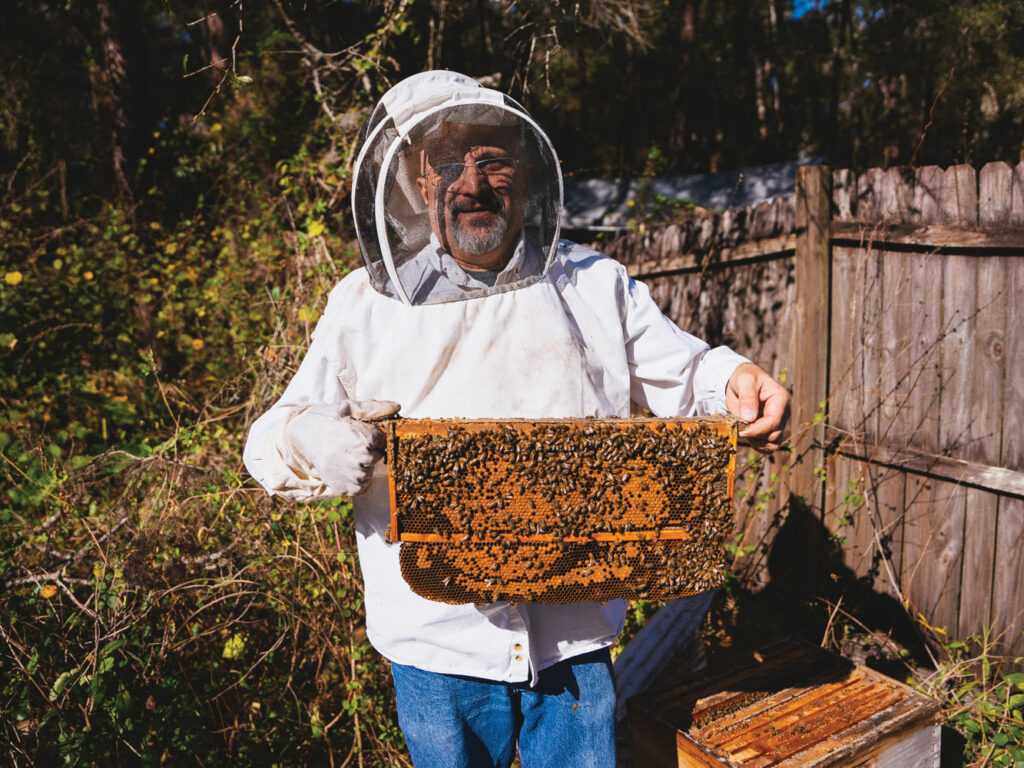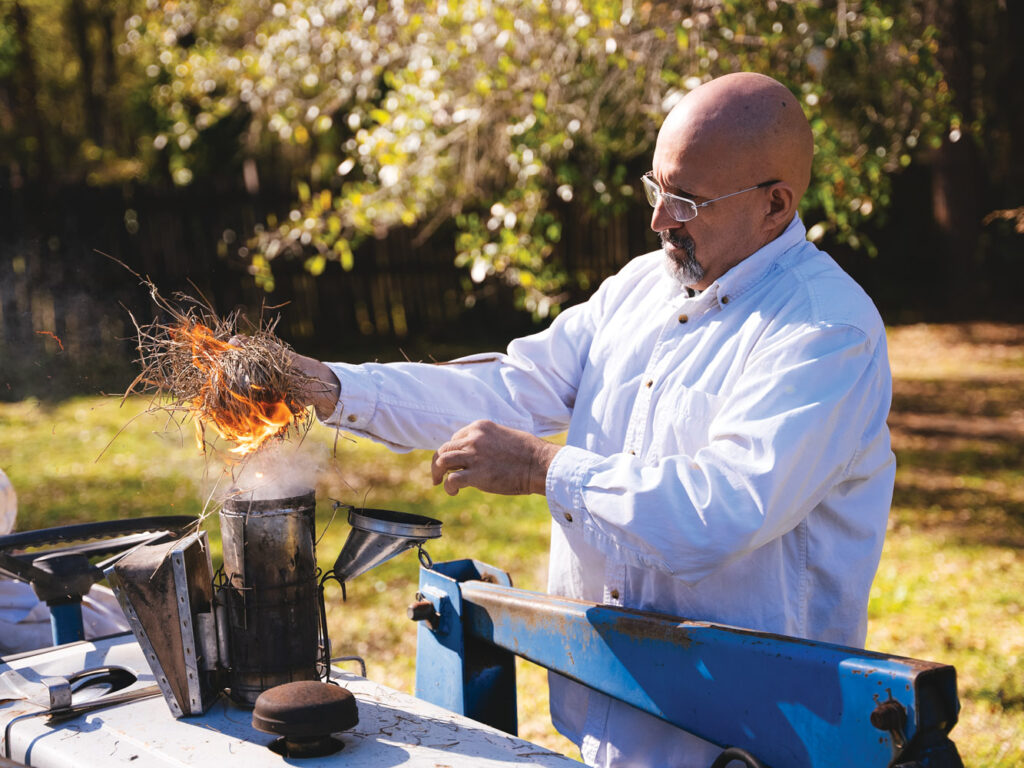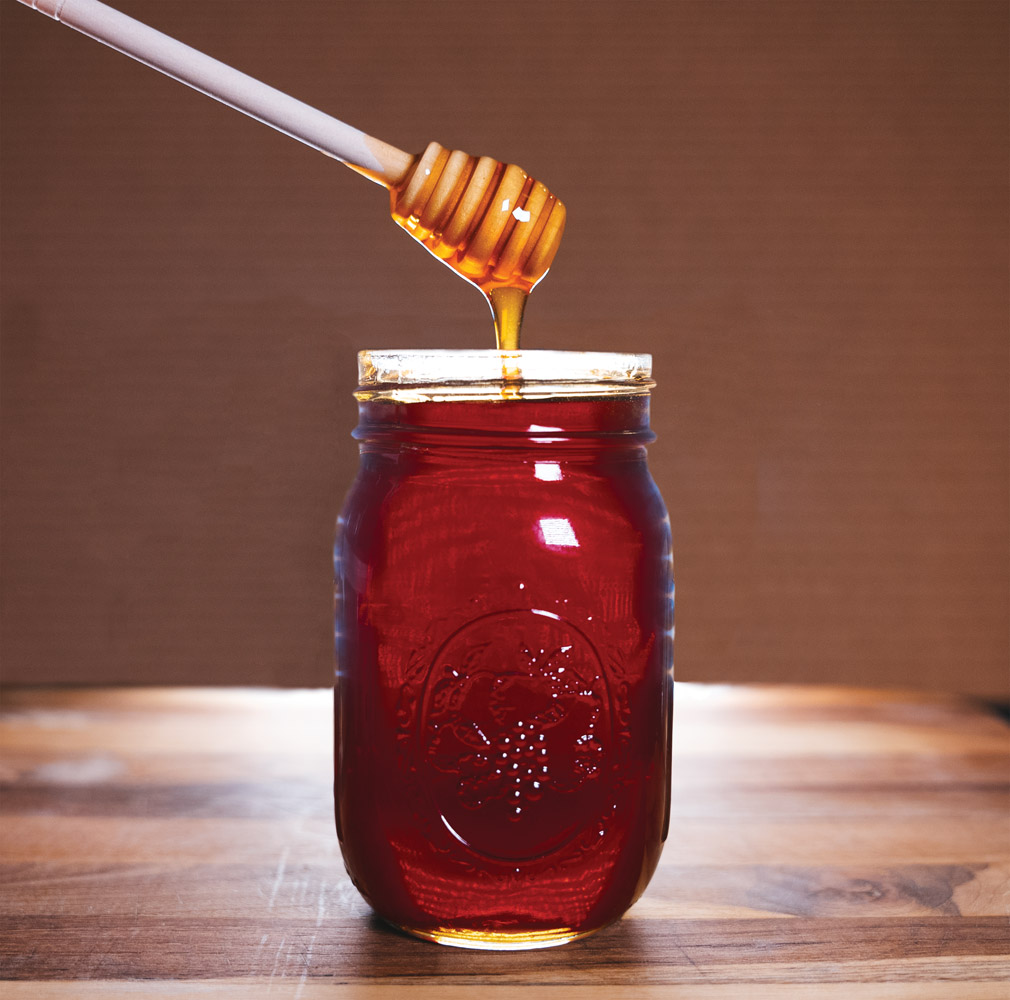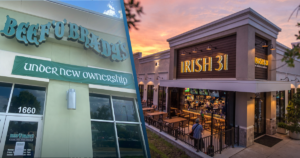
Tucked away in Angus Valley, one of the few remaining places in Wesley Chapel that business and residential development haven’t touched, Jeff Hajari gets back to nature.
On this day, he is tending to his bees, all eight hives of them. It doesn’t take a lot of work, really, now that he has been doing this for two years, but he works to keep his hive small and strong.
In his kitchen, his countertops are filled with 16 oz. mason jars of the sweet elixir his troops have produced, roughly 400 pounds in all during his most recent harvest.
A large wedge of beeswax sits nearby on the floor, below a counter of vials filled with propolis (“bee glue”), a byproduct of the hive used by people with diabetes to heal wounds, combat allergies and even soothe toothaches.
“Bees are amazing,” Hajari says. “There are so many benefits to everything they produce.”
Which is part of the reason why Hajari is so fascinated by them. Truth is, we couldn’t live without bees, as they, along with butterflies, pollinate approximately 75 percent of the world’s flowering plants and 35 percent of the world’s food crops, according to the U.S. Department of Agriculture.



Hajari, 59, was born in Kerman, Iran, and came to the US in 1987 to start a new life. He settled in New York and began a career as a home improvement contractor, but then relocated to Florida and eventually bought a home in Angus Valley.
With an affinity for nature and being self-sustaining, Hajari started with chickens and goats in his backyard, and while his attempts to make goat’s milk failed, he did successfully manage to make some soap.
But, he really wanted his own honey. Because he returns to Iran every year to help take care of his mother, barnyard animals required too much care. So, three years ago, he bought his first beehive from a woman in Dade City for $250. He transferred the hive in his truck, and says that setting it up was, well, a bit painful.
“I got stung like crazy,” Jeff says. “Probably 20-25 times. But, it was okay.”

Hajari continued to add more hives — at one point he had 12-15. But, they were weaker hives, and he has found by limiting the hives to eight or so, he has a stronger, healthier group able to resist attackers like ants and other pests. Two years ago, he designed a new entrance for the beehive to fight against varroa mites, who were capable of wiping out an entire colony.
Hajari says he learned how to keep bees like you would learn about anything — the internet and trial and error. He watched documentaries and YouTube videos, read articles and purchased a beekeeping suit. Handy with wood working, he constructed frames for the bees to expand their honeycombs. He has made mistakes, losing bees and entire hives. “Like anything, there is a science to it,” he says.
Every few months, his kitchen becomes a laboratory, where he extracts the honey from the combs and bottles it.
“It takes two days to get it all done and jarred and ready,” Jeff says. “It’s a labor of love. As long as I have enough for my coffee and tea, and my friends.”
He says that the taste each time is different, and that it all depends on what flowers were pollinated. One of his recent batches was particularly dark and bitter.
“I don’t know why, but my honey looks almost like coffee,” he says. “I’ve been to stores but I have never seen anything that looks that dark. It’s extremely dark. But, I read where the darker the better, as it has more antioxidants and antibodies. So I’m like, ‘Okay, I’m good with it.’”
He sells his honey and propolis on Facebook marketplace, which you can find by searching “Local Honey Wesley Chapel.”
Hajari will even come remove a colony of bees from your yard, if need be.
“It’s a hobby, and it’s fun,” he says.
But, there’s always something new to learn, and Hajari has now added mushroom hunting — “Not the crazy ones, the edible ones” — to his nature quest. He joined a group that goes hunting in places like Ocala National Forest, the Croom Wildlife Management Area in Brooksville and even Hillsborough River State Park. One trip yielded a basket of Chanterelle mushrooms, which he cooked up. “I’m addicted to them, they were so good,” Jeff said.
Because he has so many trees and logs in his backyard, he ordered a mushroom growing kit and is hoping to produce Shitaki, Golden Oyster and Lion’s Mane mushrooms in his own backyard. He said it takes a year.
And,before he left for Iran recently, he planted a banana tree, avocados, blueberries and blackberries.
“I just like to be self sufficient,” he says, “especially when it comes to nutrition. I want everything organic, and I like to produce it myself.” What’s next for Jeff? He’s not sure, but he seems to be just beginning. “I always like to try something new,” he says.




No comment yet, add your voice below!